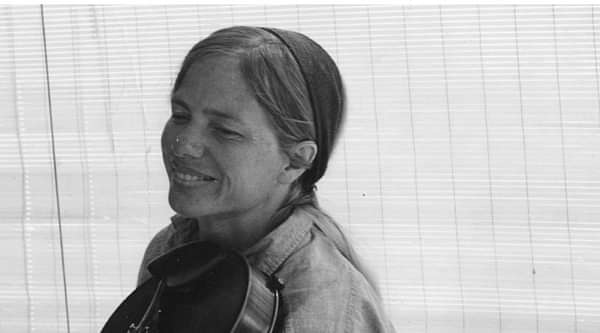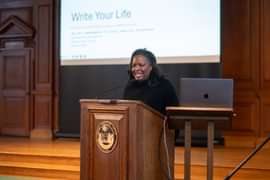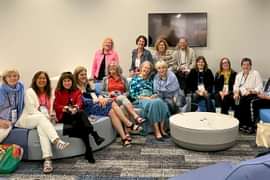
September 06, 2018
From Abbot to Andover, an education icon—Susan McIntosh Lloyd
Faculty emerita rememberedby Robert Lloyd
Faculty emerita Susan McIntosh Lloyd passed away on July 2, 2018. The following was written and compiled by her husband, faculty emeritus Robert Lloyd.
At Sue’s retirement from PA in 1997, her then department chair Vic Henningsen ’69 told a great story about her:
“It is 1986. I am a cluster dean, teaching History 30 for the first time. I am also trying to write a doctoral dissertation.
I am stuck in Chapter 3, the centerpiece of the document. It is about 100 pages long; it should be 30. It is so complicated that even I can’t figure out what it’s about any more.
On the advice of Kathy Dalton and Jeanne Amster, I position myself early one morning by the Paul Revere dumpster, prepared to intercept Susan as she bicycles by, with a request for editorial assistance.
As Susan rounds the corner, I hail her and begin to jog along, making my request. She is gracious, and curious, and has many questions. What is it about? Why have I chosen this topic? Precisely what is the nature of the problem? By now we are passing Sam Phil and I am getting winded. Susan is apparently heading for GW. More questions: Have I consulted such-and-such a source? I did? What, then did I think of so-and-so’s thesis? Did I note that his prose style seemed a bit . . . drab? We have now passed GW and I am in serious trouble. We are headed for . . . where? Graves Hall?
Suddenly, help is at hand: the Addison Gallery stairs. She stops, briefly. Yes, she’d be happy to do it. If I’d give her a draft tomorrow.
Some days later, the packet re-appeared in my mailbox. The draft is covered with notes. And now I join the legions of students and colleagues who have had the unifying Lloyd experience: reading her comments. Instructions: stop and count to 10, slowly, while rotating paper in your hand to follow the notes around the page. At the end, turn paper over and read the back!
Having done so, I am invited for tea at McCurdy house where for about three hours on a Saturday morning, I receive a tutorial from Susan Lloyd patiently walking me through her comments, expanding her critiques, and gently suggesting a variety of ways to slay the White Whale called Chapter 3.
And it worked. And it’s the best damn chapter in there.
As I reflect on that experience, I know, now, that I was getting what her students get–her time. Susan Lloyd, scholar, musician, social activist, raiser and humane killer of sheep, choral director, and who knows what else, pays more attention to her individual students than anyone else I know. For a moment, I was lucky enough to become her student and find that out for myself.”

Sue was a person in motion, purposeful, planned, and physical – walking and talking with friends and colleagues; dragging brush near our Tinmouth, Vermont, cabin (not a favorite activity with our sons); planting and weeding our vegetable garden; horseback riding with our niece; helping a neighbor with seasonal haying; capturing and dosing sick lambs; paddling bow in our canoe across the lake to the next portage; driving or bicycling to Lawrence from Andover to raise funds for the Urban Studies Program; driving our sons to Boston for music lessons;
driving to southern New Hampshire to visit my aging, ailing mother; driving to western Massachusetts to care for her aging, ailing mother until she died; driving a van full of PA students to visit our land in Vermont on lamb-slaughtering day, to stack firewood in a neighbor’s cellar; shepherding the Pine Knoll Cluster as dean; driving around the northeast to interview contributors to the Abbot and Putney histories; driving to Gloucester to visit Helena Glenn, who supervised Sue’s disastrous first public school teaching attempt in the summer of 1956; bicycling–rain, shine or snow–from north Cambridge into Boston for two years–the second pregnant with Ben–to teach scholastically handicapped male teenagers at the Kingsley School; driving to New York City to chair the board of the Amateur Chamber Music Players, who recently established the Susan McIntosh Lloyd Award given to an organization reflecting her commitment to chamber music education for young people;
taking a bus to Manhattan, Kansas, where she stayed in the YWCA, to research a paper on Women Educational Leaders in the Progressive Era; driving to board meetings of her beloved Putney School; flying with Fidelio and PA orchestra to Spain to play, conduct and chaperone the spring tour; taking a bus to West Point, Mississippi, to hide in the black community–away from the white community–and check out how Dora Adams was spending funds sent her by the Andover Committee for Equal Opportunity; flying to communist China to spend two months teaching non-communist American history and literature to students at Harbin Institute of Technology;
driving to the Tinmouth School to take minutes of the School Board meetings; driving here and there in Rutland County as a Guardian ad Litem to visit children in difficulty and then driving to Family Court to protect their interests; driving to rehearsals in Rutland of the Lakes Region Youth Orchestra to coach fledgling string players; traveling to meetings of the National Board for Professional Teaching Standards which was developing methods for improving and evaluating school teachers; riding a crowded bus to Washington, D.C., to hear Martin Luther King’s “I Have a Dream” speech; transporting Elsie Jemmet and her four children from Roxbury to Andover and back, from Roxbury to Tyringham and back to show them a “Somewhere;” wielding the viola bow in a Beethoven string quartet; in 1956, walking down the aisle in the Tyringham church to marry me. We were married for 62 years.
Phillips Academy inherited Sue the history teacher via the merger with Abbot in 1973. She brought seeds of concern that informed her teaching. A student in U.S history that first year writes: “We sat with open books, open notebooks, pens at the ready. ‘What did you think?’ asked our teacher. One by one, we tried: ‘The author says…,’ ‘on page 16,’ ‘in the introduction…’ Each time, kindly, patiently, generously, sometimes with a chuckle, came the response: ‘I asked what you think.’ Finally one of us…said, ‘I think the Puritans were contradictory. ‘Excellent. Let’s start there.’ That teacher was Susan Lloyd, and for me, and perhaps for others, and particularly perhaps for those of us girls who had not always been praised for speaking our minds, it was the beginning of a different education.”
Most of all, I remember her kindness, warmth, care and love.
”Sue’s desire was to help individuals find their own voices. The Urban Studies Institute, which she created, mingled groups of Lawrence High School students with PA students to study aspects of housing and education in Lawrence, and to write reports for the adult community. Two USI graduates write:
In the mid 1980s, facilitating collaboration with Lawrence High School was new—especially since it was a joint intellectual pursuit, not community service. Sue Lloyd was having none of the old “noblesse oblige” style project. Sue conceptualized a program that took a group of teenagers and pushed them—not just as volunteers who fell into their predictable roles, but to think about our places in the world and what we wanted to do with our lives. We read works of sociology (Oscar Lewis) and critiques of works of sociology. We learned how to do a literature review. Oh, the bibliographies! The writing and the edits and the edits and the edits! Sue was so patient, but so exacting. She was insistent that USI would not be a way to glide out of Andover with a “gut.” Of course, what made the experience so enriching was not just the studying and the writing, but the fieldwork with our peers at Lawrence High and our time in the Lawrence public schools. “Woke" wasn’t a word I had learned yet in 1986, but Sue Lloyd—with her long blond hair and deep voice—did her best to take small groups of students and wake them up to the world, our place in it, and what we could do to change it.
I was only 16 when I came to study at Phillips Academy already a junior in high school and the youngest in my family. Those 10 weeks living with Susan and studying at Andover changed me forever and allowed me to become the person I am today. At Andover, I learned that I was smart enough to compete with the best students from around the world. I learned study habits, independence, responsibility and how to think critically. I was also brought into her lovely home and felt the warmth and love that she bestowed upon everyone in her care. Now, thanks to her, I am the only one from my family to have completed college and have the honor of running a similar program at Phillips Academy called Mathematics & Science for Minority Students (MS)2.
PA enrolled a number of foreign students to take a senior year in the United States, all of them bright, many of them struggling with the English language. This deficit made the legendary U.S. history course, which was required for the diploma, a doubly difficult hurdle for these students. Sue created a special course for this group that for two trimesters gave special attention to basic English—sometimes using 4th and 5th grade history texts – and readied them to enter regular sections of History 30 in the spring trimester with a fair chance of earning a PA diploma. Here are reports from two of the first Chinese students from Harbin:
She is remembered fondly by those of us that Sue taught and served. She is more than a teacher, she is a friend and mother to us. I still clearly remember the first day I arrived at the Lloyd’s house, I remember the rocking chair, the staircase, the bookcase, the kitchen, The NY Times, and the radio which plays NPR for news every evening. I remember the many trips we took to their lodge in Vermont, the hatchback, the conversation, the veggie garden, the blueberries, making ciders, getting fresh milk from neighboring dairy farm, the Toyota pickup. Most of all, I remember her kindness, warmth, care and love. The Lloyds filled the void in my heart (homesick, loneness). They were my family in those years.
Sue was such a nice and kind person who knew how to help others and was always willing to give her help. I will always remember how Sue and Bob took us to Tyringham for Thanksgiving and Christmas, how they kindly let us stay on their Vermont farm for extended periods of time, and how they took me in when I was on leave of absence between my sophomore and junior years in college when I was in a very bad state. It was with the care and guidance from Sue that I was able to recover enough to go back to finish my college at the University of Chicago. She also wrote recommendation letters that helped me get into graduate programs at Columbia and then at Princeton.
Sue retired from P.A. about the same time the HIT-Andover program was ended, and it seems the vast majority of the students on that exchange program took Sue's American history course for international students. Many in the group recall the same thing as I do—that the Lloyds gave us much help beyond the courses we took with them.
Sue developed her own voice through writing and publishing two books of institutional history, untold numbers of conversations with history teachers, professors and writers, and debating evaluation methods on the National Board. But she brought two other voices with her from Abbot: singing and viola playing. She coached string players in chamber music playing, in which each individual voice is equally important, and in which listening to the other players is the sine qua non of success. In conversation with Ted Sizer, who also arrived in 1973, Sue directed his attention to William Thomas, a young, black cello player who had greatly impressed two of our sons at chamber music camp. Ted hired William, whose infectious energy and high standards brought new life in to PA’s music program for many years.
Perhaps Sue’s greatest contribution in this area was as director of Fidelio, another Abbot legacy, which consisted of 16 dedicated students singing a cappella. Here are some student memories of how they found their voices:
I had never met an adult so conspicuously powerful as Sue appeared to me. My first impression of Sue—Mrs. Lloyd—was that she meant business. My second impression was that she exhibited an unusual gap between the gusto she put into the doing of things versus and the little visible energy she needed to exert total command.
Sue could do just about anything. There were the painfully obvious, if implausible, examples of her doubling me on the bass part when I faltered. But I'm also pretty sure she made the water boil just by looking at the kettle.
Sue proved over and again we could do more than we imagined. Sue demonstrated mastery, a "can do" confidence, and a "why not?" attitude to tackling things which perhaps had never been done before. To this day, rehearsing around her kitchen table is my image of work as fun.
Sue’s other great gift to me was music. I sang soprano in Fidelio for several years, and the group rehearsed around her dining room table. No piano, no pounding out of the parts, just Sue and a pitch pipe (and often Bob in the living room informing us whenever the tenors were going flat). Learning how to sing that way felt like intensive voice lessons for all 16 of us. I sang in college (quite a letdown after singing for Sue and William Thomas at PA), and since then my vocal skills have primarily been used for worship. During my recent pilgrimage to Israel/Palestine, I was described as a “classically trained singer,” along with two other sopranos on the trip. If I could ever be perceived that way, Sue is the one who made it happen.
Around her dining room table during Fidelio rehearsals, she led the group with her deep love of music, always giving us our beginning notes in her inimitable viola-like contralto. Her intellect, humor, kindness, and gentleness created a humming bass-line in counterpoint to the high-pitched overtones of prep school life. And though she no longer gives us our starting pitches, her sweet and low voice continues to resonate. I will always remember her sincere smile and the restrained insistence of her conducting. I will always remember that she introduced me to Renaissance vocal music, and I will never hear or sing a Madrigal again without thinking of the incomparable Mrs. Lloyd.
Sue Lloyd brought with her a contagious commitment to the sensible inclusion of women in what had been a male enclave for 186 years. She and six other women of the history department formed the Emma Goldman society which, Jeanne Amster says, “was established to bring irreverence to great deliberations. Signature activities included wedding cooking, champagne after final exams, a fully established set of secret hand signals often deployed during faculty, department and committee meetings, and generally good parties.” Mary Mulligan, a younger history colleague, says, “She was completely authentic and lacked all pretense, and despite that, or because of it, thrived.” Another writes, “Sue had a sturdy sense of social justice, coupled with a willingness to stand up to anyone if need arose. She could not be cowed. As a younger woman, I knew that Sue, and other women of her generation, had made a path smoother for me as I entered what was still a pretty male world.”
Vic Henningsen has the last words:
When Susan joined the Andover history department following the merger with Abbot Academy, she entered a classic “old boy” network: self-important, murderously competitive, test-bound, and happily shackled to a lockstep, increasingly anachronistic curriculum that hadn’t changed since the late 1940’s. Why should it, they thought? We know all of the important historical questions and have all of the answers.
Susan was a central part of the wave of social historians who utterly changed the department – modernizing pedagogy and curriculum to reflect a belief (best expressed by James Thurber) that it was better to ask some of the questions than to know all of the answers.
Their work lives in the department of today, which by every conceivable measure more closely reflects the spirit of the Abbot Susan brought with her than that of the Andover she joined. She was a quiet revolutionary, uninterested in taking or getting credit. She knew the lasting value of the goals she sought and largely achieved, even if many of the rest of us didn’t fully understand them until much later. She just kept going – she knew we’d catch up eventually.
Other Stories

Best-selling author Rachel Howzell Hall delivers MLK Day keynote




